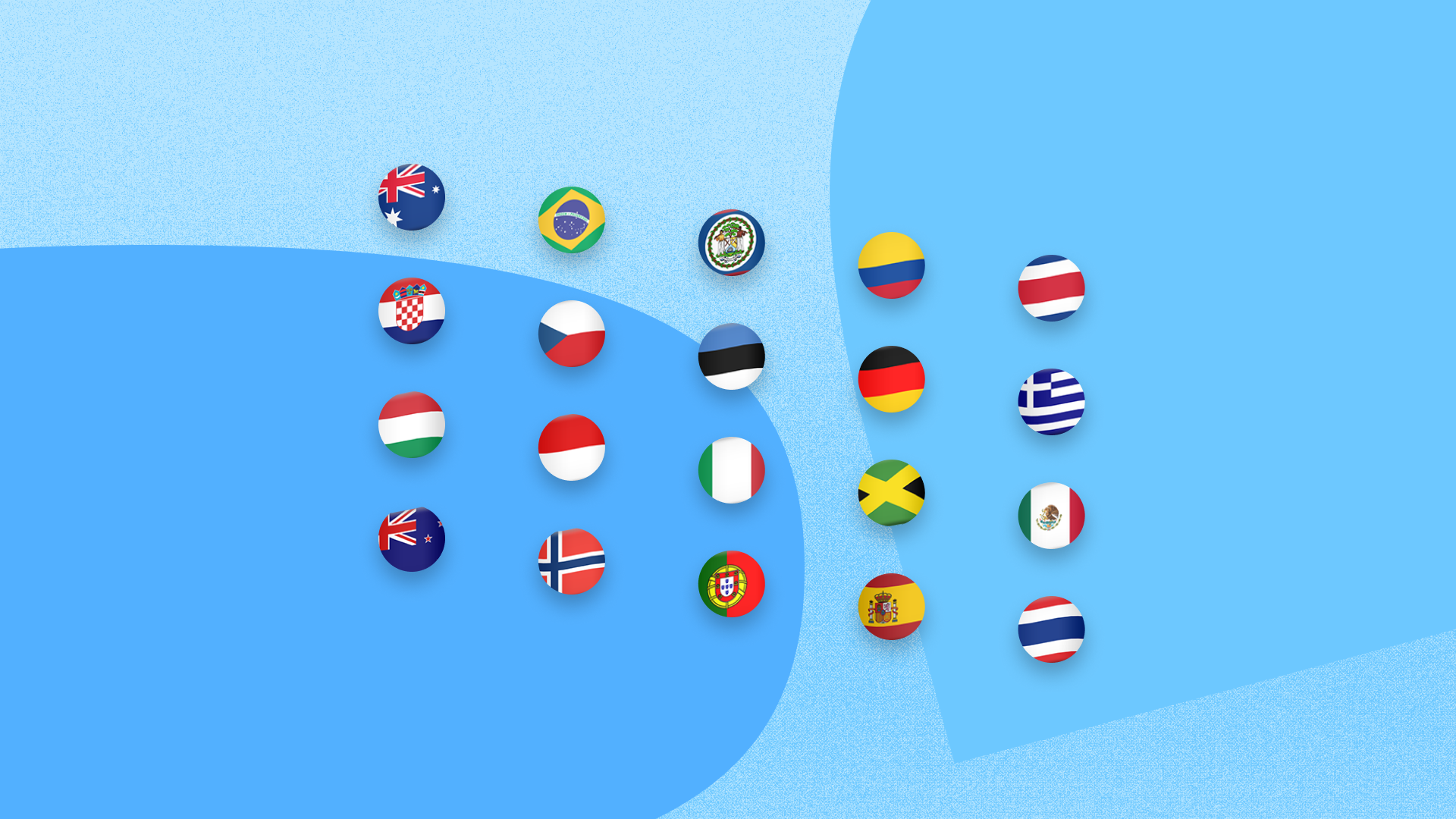20 Countries that Offer Remote Work Visas
As technology allows for more flexibility in the workplace, many countries have begun to offer remote work visas to accommodate these shifts. In this guide, we’ll give you a breakdown on remote work visas and some countries that offer them.

What is the difference between a digital nomad and a freelancer?
How do taxes work for remote work visas?
20 countries with remote work visas
How Justworks Can Help
Sometimes referred to as digital nomads, remote visa holders have the flexibility to either work a remote job or work remotely as a freelancer. Many workers choose to make this leap to work remotely in a foreign country for both the cultural experience and for a cheaper cost of living.
For many countries, offering remote work visas is an excellent way to invigorate the global economy and promote global mobility on a smaller scale. Countries can boost their economies with new talent and businesses of all sizes can reach a wider range of customers.
What is the difference between a digital nomad and a freelancer?
A freelancer can be a digital nomad, but there are some key differences between the two when applying for a remote work visa.
Freelancers: Freelancers are self-employed individuals who work for themselves or businesses as contractors. Freelancers don’t have to work a set schedule, which means they can work remotely from home or travel while completing each individual project.
Digital nomads: Digital nomads travel and work remotely. The main criteria for digital nomads is working while living a “nomadic lifestyle.” Digital nomads can work remotely full-time for a company or they can work remotely as a freelancer.
The criteria for obtaining any of the remote work visas listed here applies to both freelancers and digital nomads. Most countries require workers to be employed by a company outside of their native country or show your 1099-contractor status. For both digital nomads and freelancers, workers must prove that they make a certain amount per month over the monthly minimum wage in that country.
How do taxes work for remote work visas?
Some countries require their workers to pay taxes while living there, some countries have special tax rates and deductions for remote workers, and others do not require remote workers to pay taxes. However, the majority of countries expect remote workers to have international health insurance and pay into their social security system.
Below we’ll review how taxes are expected to be paid for each country.
20 countries with remote work visas
1. Australia
When applying to work remotely in Australia, first-time digital nomads will need to apply for the First Working Holiday Visa, which provides temporary residence for one year. After your trial year, you can apply for an extension for a Second Working Holiday Visa.
Eligibility for work visa:
Between 18-25 years old
Must be applying solo (no dependents are allowed)
Have a passport
Must have a freelance or remote work job in another country for at least six months prior to application
Make enough money to support yourself (website recommends $5,000 AUD or $3,302 USD)
How to apply:
Apply here (website will only work outside of Australia)
Normal processing time is around 14 days
Taxes:
Zero taxes but you must be paying taxes in your employer’s country
2. Brazil
In 2022, Brazil created digital nomad visas in order to boost the economy. Digital nomads can now apply to live and work remotely in the country for 12 months under this visa.Once expired, you have the ability to extend your stay for another 12 months.
Eligibility for work visa:
Must have a self-employed freelancer position or remote position at a country outside of Brazil
Must make at least $1,500 USD per month or have at least $17,000 USD in your bank account
No criminal record
International health insurance that is covered in Brazil
Confirmation from employer through a declaration letter that your position allows you to work remotely
Payment of $100 USD for application fee
How to apply:
You must apply in-person at a Brazilian consular office
Processing time can take up to one month
Taxes:
Zero taxes but you must be paying taxes in your employer’s country
3. Belize
Belize is a tropical country located in Central America. The country recently launched their Work Where You Vacation remote work program for digital nomads. Remote workers have the ability to remotely work in Belize for up to 180 days under this visa.
Eligibility for work visa:
Demonstrate employment outside of Belize
Make a minimum of $75,000 USD per year for singles and $100,000 USD for couples applying together
Share a notarized banking statement
Supply a clean criminal record
Hold a valid passport
Carry travel insurance with a policy minimum of $50,000 USD
How to apply:
Fill out application and apply here
Processing time between two weeks and one month
Taxes:
Zero taxes but you must be paying taxes in your employer’s country
4. Colombia
Colombia is quickly becoming a hub for digital nomads and for tech startups in Latin America. Colombia recently launched a remote work visa that allows foreign workers to live in Colombia for up to six months in one year. The visa is good for up to two years, so if you're planning to explore the digital nomad lifestyle, you can come and go from Colombia as you explore other countries in Latin America.
Eligibility for work visa:
No paid work from an employer within Colombia
Employment by a foreign company or starting a digital business that could be of interest to the Colombian economy
A monthly income of at least $900 USD
Letter of declaration from employer proving that you work remotely for their company
How to apply:
Submit a completed application online
Processing time is up to one month
Taxes:
Remote workers will only have to pay taxes in Colombia if they stay for more than 180 days
5. Costa Rica
With San Jose being a hub for tech startups in Latin America, you’ll find both the rush of a cosmopolitan lifestyle mixed with laid back beach vibes when you apply for Costa Rica’s digital nomad visa. Costa Rica allows remote workers to live and work within the country for up to 2 years.
Eligibility for work visa:
Proof of monthly income of $2,500 USD or a deposit of $60,000 USD in a Costa Rican bank account
Self-employment or being employed by a company outside of Costa Rica
Having travel insurance of at least $50,000 USD
Proof of payment of $100 USD for application
How to apply:
You can either apply in-person at a Costa Rican consulate or online here
All documents in a language other than Spanish must be translated
Processing time is up to one month
Taxes:
Remote workers are exempt from paying income taxes in Costa Rica
6. Croatia
Croatia’s remote work visa allows expats to live in the country for up to 12 months while working remotely.
Eligibility for work visa:
Proof of self-employment or remote work from a foreign employer
Minimum of $370 USD in income or savings per month
A clean criminal background check in country of origin
Proof of accommodation (lease or written agreement from landlord) if you’re staying for more than 10 days
Health and travel insurance
How to apply:
Obtain a personal identification number for the social security system
Complete the application form
Provide two passport-sized photos
Pay $75 for application fee
Processing time is 30-60 days
Taxes:
Zero taxes but you must be paying taxes in your employer’s country
7. Czech Republic
The Czech Republic’s version of a remote work visa, the Zivno, can be a little more complicated to obtain than others on this list. This visa is valid for one year and can be renewed for an additional year.
Eligibility for work visa:
Must apply for a business and have a trade license
Proof of accommodation for at least one year
Proof of at least $6,385 USD per person in your bank account
How to apply
Make sure you have all the required documents
Make an appointment with your local Czech Embassy or Ministry of Foreign Affairs
$114 USD application fee
Processing time is anywhere from 90-115 days, so make sure you apply early
Taxes:
In the Czech Republic, you are required to pay around $80 USD in local taxes each month of your stay
8. Estonia
Of all the countries on this list, Estonia is the first country to offer e-residency. This is a government issued digital identity that gives you transparent access to business and public services all over the country. Long-stay digital nomad visas in Estonia are valid for up to one year.
Eligibility for work visa:
Be self-employed, own a location agnostic business, or work for an employer outside of Estonia
Earn at least $3,500 USD per month
Have a valid passport
Proof of accommodation
Have a work contract if remotely employed for an outside employer
Proof of health insurance coverage of at least $30,000 USD
How to apply:
Complete the application form
You can apply in person at an Estonian Embassy; you’ll have to make an appointment online
Application fee is $80 USD
Processing time ranges anywhere from two-four weeks
Taxes:
Under 183 days no income taxes
Over 183 consecutive days makes you eligible for taxes as you are now considered a resident
9. Germany
Germany has one of the best transportation systems in Europe as well as a fast-paced business lifestyle. Thanks to a new Digital Nomad Visa in Germany, remote workers can live and work in Germany anywhere between six months to three years.
Eligibility for work visa:
Work remotely or as a freelancer for a company outside of Germany
Prove that you have an income of at least $1,400 EUR per month
Proof of accommodation
Health insurance plan
How to apply:
Gather all required documentation
Schedule an appointment with the immigration office
Pay application fee of $105 USD
Processing time is between five-six weeks
Taxes:
In Germany, you are required to pay income and local taxes because you are considered a resident. You will need to register with the German Tax Agency.
10. Greece
Some of the oldest culture in the world comes from Greece. Remote work visas in Greece are good for up to 12 months.
Eligibility for remote work visas:
Must be a non-EU, EEA, or Swiss citizen
Have a monthly income of at least $3,700 USD
Self-employed or employed by a country outside of Greece
Not eligible for Greek tax residence status for at least five of the last six years
Health insurance
Written agreement that you will not enter into employment with a Greek employer
How to apply:
Fill out and submit your application at a Greek embassy
Processing time is as low as 10 days
Application fee is $80 USD
Taxes:
If you spend more than six months in Greece, you will have to pay taxes
11. Hungary
Budapest and the rest of Hungary are known for having a rich culture and amazing architecture. The remote work visa in Hungary is called the White Card and is valid for 12 months and can be renewed for an additional year.
Eligibility for work visa:
Passport that is valid for six months before application
Bank statement that proves income of at least $2,111 USD per month
Employment or self-employment outside the country
Travel health insurance that includes Hungary
Lease or booking confirmation that proves accommodation once you arrive
How to apply:
Complete your application with all required documentation
Submit documentation at a local Hungarian consulate
Pay application fee of $125 USD
Processing time usually takes one month
Taxes:
You will become a tax resident if you spend more than 183 days in Hungary and will have to enroll for income tax deductions
12. Indonesia/Bali
One of the more popular places for digital nomads, Bali offers a low cost of living and a wide-range of beaches. Indonesia, where Bali is located, just recently launched a remote work visa. Right now the original digital nomad visa is only 60 days with the option to extend twice. The Indonesian government is hoping to launch a 5-year digital nomad visa in 2023.
Eligibility for work visa:
Valid passport for at least 36 months after arriving
Self-employed, freelancer, or remote worker for a company outside of Indonesia
Proof of health insurance
How to apply:
You can apply here
Taxes:
Right now, remote workers pay zero taxes because they aren’t able to stay longer than 183 days. Passage of the extended visa may require income tax deductions for those living in the country longer than 183 days.
13. Italy
Another cultural hotspot, Italy offers both the fast-paced city life in places like Rome and quiet vibes in seaside towns along the Amalfi coast. A remote work visa for digital nomads was passed in 2022, but the application has not officially launched yet.
Eligibility for work visa:
Clean criminal record
Be a non-EU or EEA citizen
Proof of suitable income in the Italian state you plan to live
Have an annual gross income of at least $8,500 in the previous year
Provide proof of accommodation
Work independently or for an employer outside of Italy
Health insurance coverage for the first 30 days in Italy
How to apply:
Applications should open in 2024
Taxes:
Right now, the tax situation is still unknown. However, most European countries require zero residence taxes for the first 183 days, so it’s likely that taxes will be similar in Italy
14. Jamaica
Although only available to digital nomads in the US, Jamaica is a great option for US-based remote workers because there are no minimum income requirements. The remote work visa is good for up to 2 years and allows for US-based dependents to apply.
Eligibility for work visa:
Provide proof of a US passport
Work for a company or be self-employed outside of Jamaica
No minimum income requirements
Have travel insurance
How to apply:
Apply at a Jamaican embassy
Apply for travel authorization
Processing time is only 10 days and the application is free
Taxes:
Zero taxes are deducted in Jamaica on income from working remotely for a foreign employer
15. Mexico
Mexico offers a temporary resident visa that remote workers can apply for that can last anywhere from six months to four years with proper documentation and renewal.
Eligibility for work visa:
Proof of a valid passport
Self-employment or remote work for a company outside of Mexico
Proof of income of about $2,600 USD
How to apply:
Complete the application form
Schedule an appointment with a Mexican embassy or consulate
Application fee is around $281 USD
Processing time is between four-six weeks
Taxes:
Zero income tax deductions in Mexico as long as you’re paying taxes in the country you’re employed in
16. New Zealand
Immigrating to New Zealand consistently proves to be one of the more challenging countries in the world. However, if you want to work remotely, they offer a Working Holiday visa similar to Australia’s holiday visa. In New Zealand, these visas are good for up to one year, with US and Canadian remote workers eligible to apply for up to 23 months.
Eligibility for work visa:
Nationality requirements and eligibility will differ
Between 18-35 years old
$210 USD per month of income and savings in your bank account
Work as your secondary purpose of visit
Pass an immigration health check
Valid passport for at least 15 months after application
How to apply:
Apply for the visa online
Application fee varies depending on country of residence
Processing time varies from 28 working days to 89 working days (so apply with plenty of time)
Taxes:
You are not required to pay income taxes in New Zealand on income earned outside of the country to avoid double taxation
17. Norway
Although the cost of living in Norway is a bit higher than the rest of Europe, the Norwegian government strongly protects residents and offers a wide-range of public services. There is no set duration for Norway’s remote work visa; however, most digital nomads choose to live in the country for around two years.
Eligibility for work visa:
Freelancer or employment for a company outside of Norway
Relevant qualifications that prove you are stable in your profession
Proof of accommodation in Norway (lease, written statement, and a copy of landlord’s ID)
Proof of income of at least $37,710 USD per year before taxes
How to apply:
Fill out and provide all of the required documentation
Fill out application form
Schedule a meeting to drop off application form at a Norwegian embassy
Application cost is $677 USD
Processing time is around two weeks
Taxes:
After 183 days in Norway, you are considered a tax resident and subject to income tax deductions on your remote employment
18. Portugal
Remote workers who live in Portugal usually find themselves falling in love with the country. The Portuguese digital nomad visa is good for up to one year.
Eligibility for work visa:
Proof of employment contract at a country outside of Portugal
Stable employee for at least 12 months
Formal letter from employer confirming that you can work remotely for one year
Make 4x the Portuguese monthly salary which equates to $2,976 USD
Clean criminal background
Proof of accommodation during your stay
How to apply:
Fill out the application form
Schedule an appointment at the nearest Portuguese consulate
The initial application is $180 USD and the residence permit is $303 USD
Processing time ranges anywhere from four-six months
Taxes:
In Portugal, you are required to pay income taxes. Your tax residency depends on your country of origin.
19. Spain
The Spanish government just recently decided to create an extensive digital nomad program within the country, and the official visa will launch for remote workers in 2023. Upon approval, digital nomads will be able to live and work in Spain for up to five years as long as they�’re remotely employed.
Eligibility for work visa:
Work remotely for a company based outside the EU or EEA
Prove that you have been working remotely for one year before application
Provide a valid employment contract
Meet a minimum monthly income requirement of $2,111 USD
Pass a criminal background check
How to apply:
Meet the minimum requirements to apply
Book a visa appointment at a local embassy and pay visa fee
Taxes:
Fixed rate of 24%
20. Thailand
Another popular destination for remote workers, Thailand offers a mixture of city and beach life. Cost of living in Thailand is relatively low compared to Europe and the US. The Long Term Residence Program in Thailand allows applicants to stay in the country for up to 10 years with proper documentation.
Eligibility for work visa:
Valid passport for six months after application
$80,000 USD annual income per year
Health insurance with coverage up to $50,000 USD
Remote work proof either self-employed or with an employment contract outside of Thailand
How to apply:
Comply with proper documentation
Submit your application
Application fee is around $1,440 USD
Processing time is 30 working days
Taxes:
Zero taxes are required for income earned outside of Thailand
How Justworks Can Help
Justworks’ global EOR is the solution for small businesses looking to easily hire talent in countries where they don’t already have a legal presence.
Justworks has direct entities in 11 countries, with the ability to hire in 100+ additional countries upon request through our trusted local partners. You can fearlessly handle HR essentials like payroll, benefits, local compliance, and more.
Learn more about our EOR services, and get started today.
Learn more with Justworks’ Resources
Scale your business and build your team — no matter which way it grows. Access the tools, perks, and resources to help you stay compliant and grow in all 50 states.






